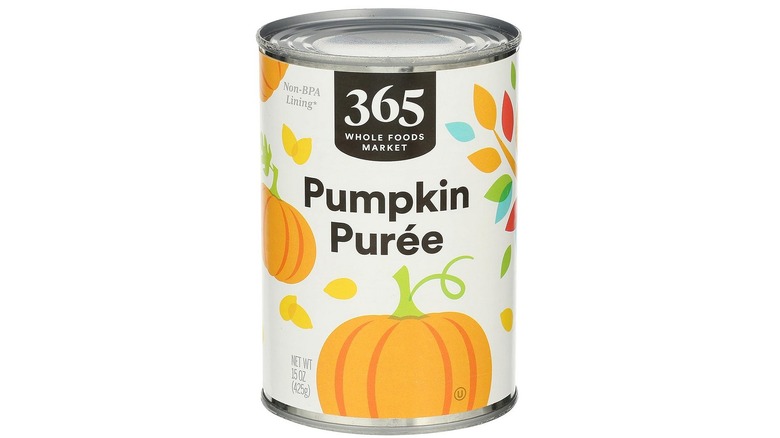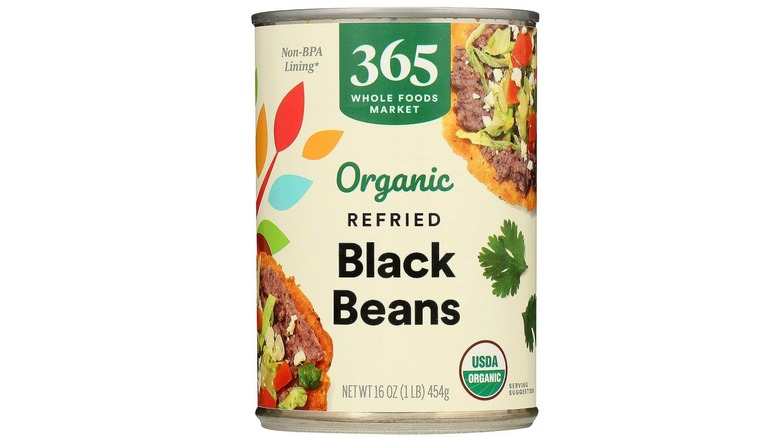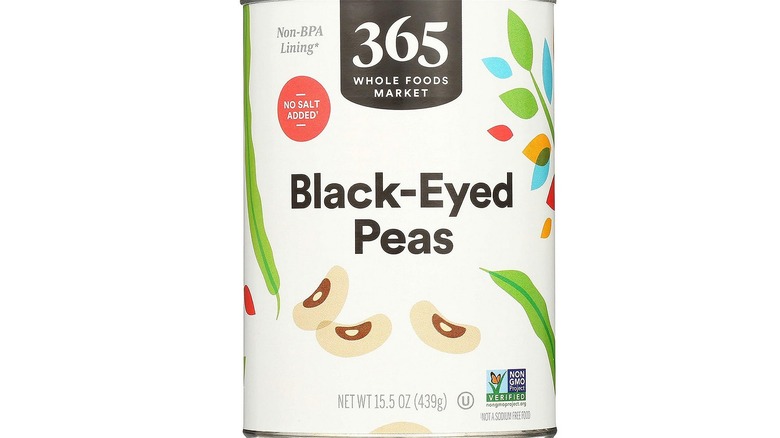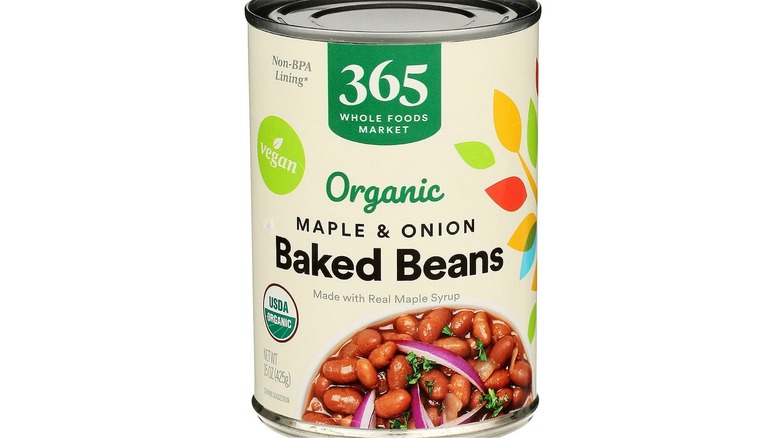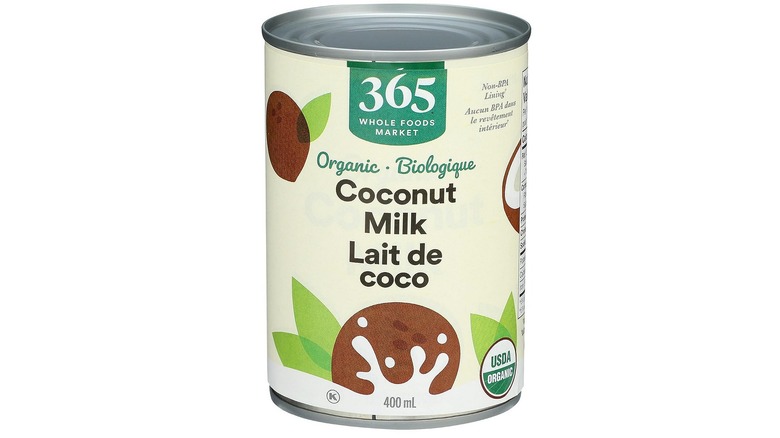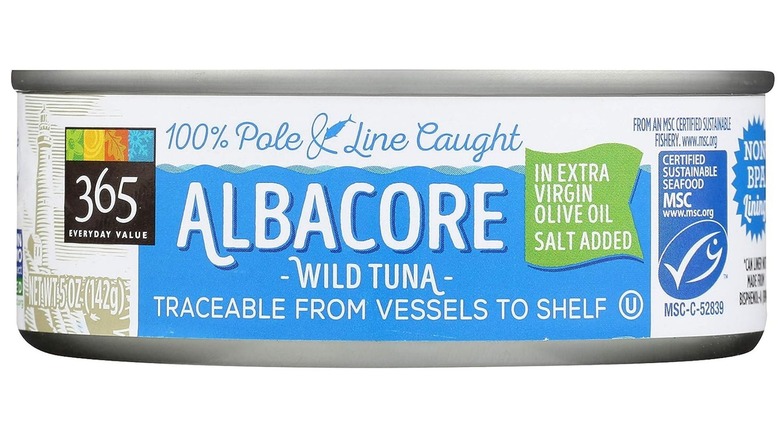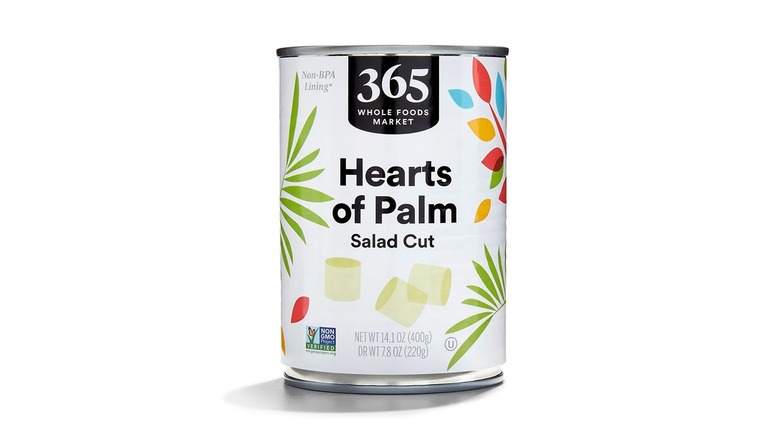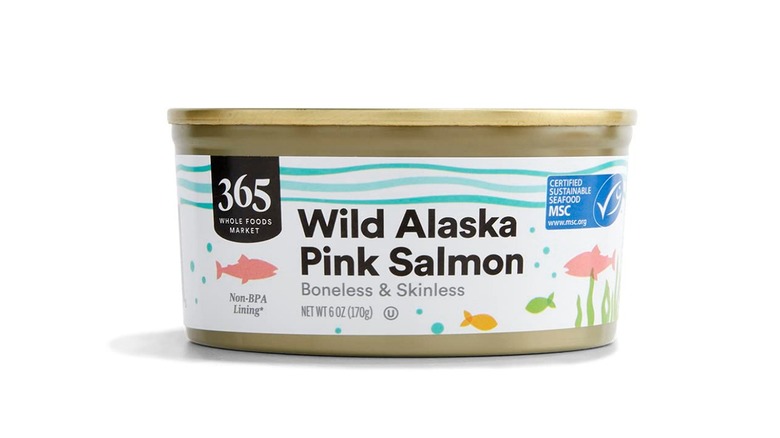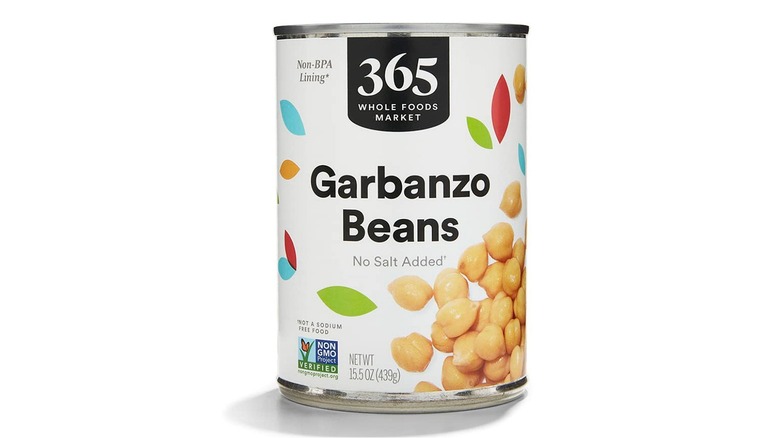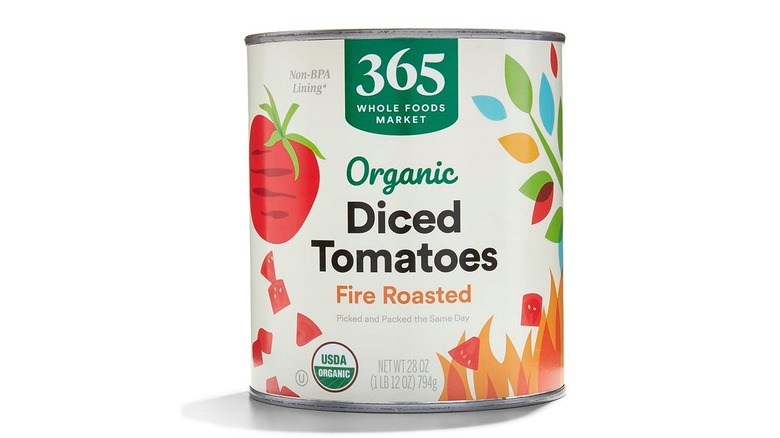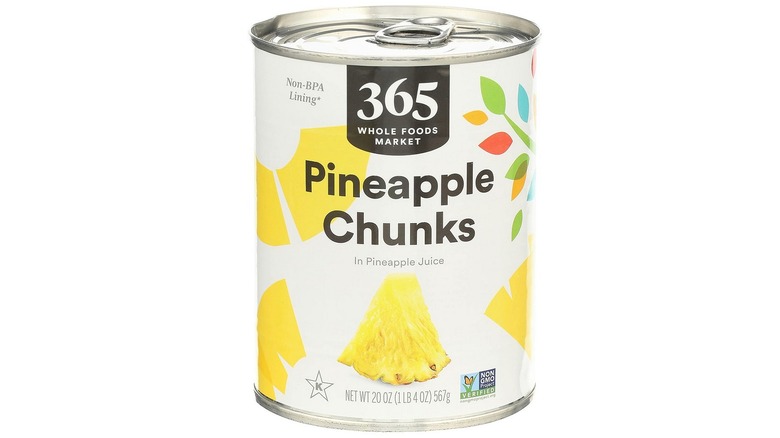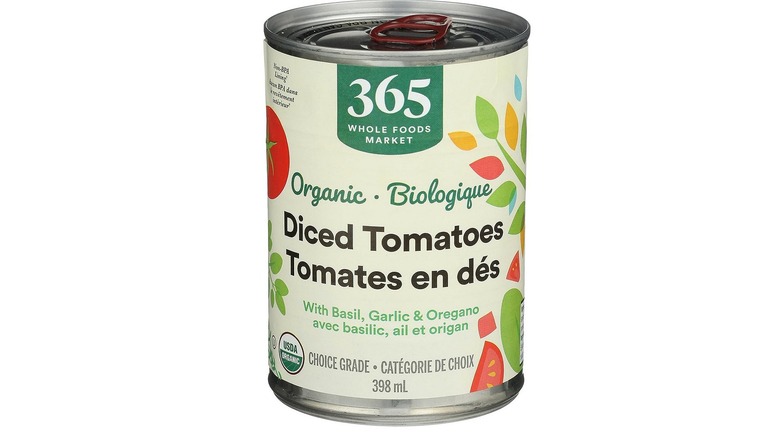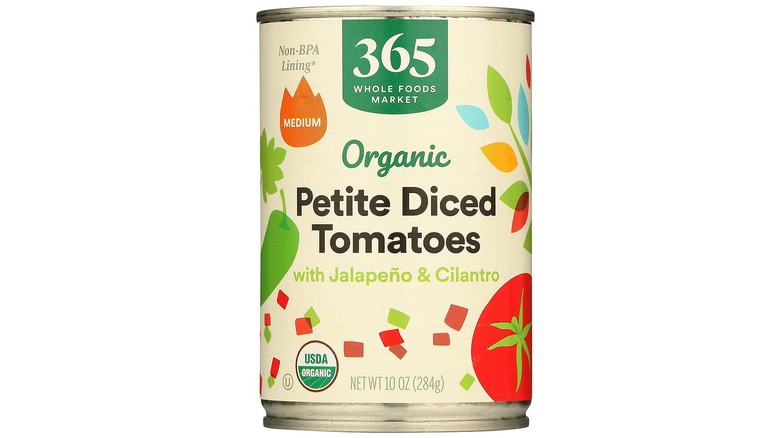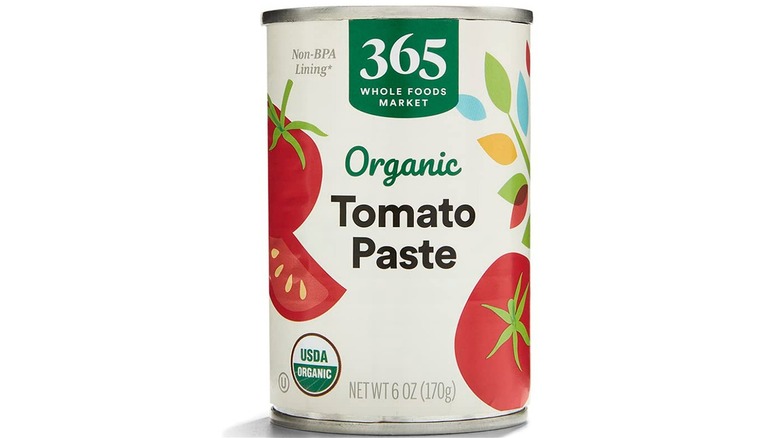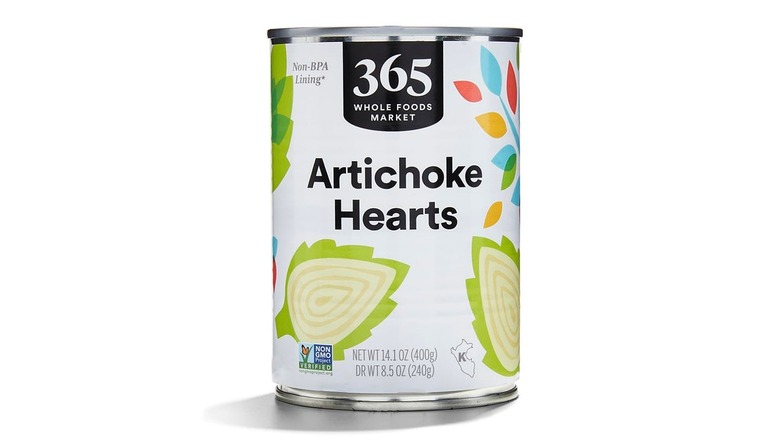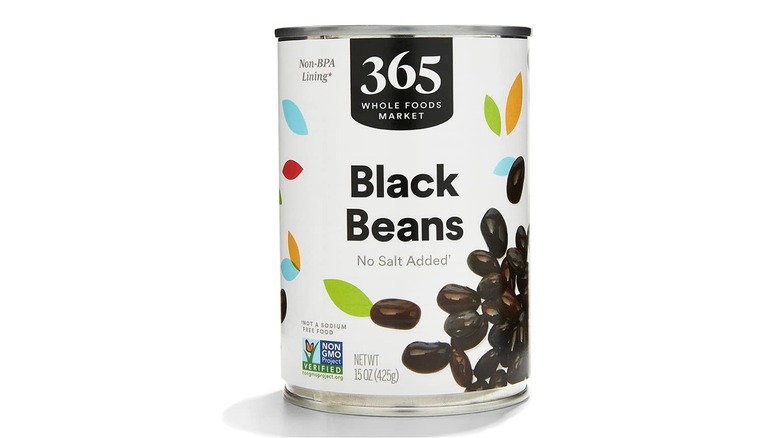16 Best Whole Foods Canned Goods
When we asked readers where they most like to shop for organic groceries, Whole Foods was chosen as the top national retailer. Local grocery stores may have topped the survey results, but when it comes to chain markets, Whole Foods beat competitors like Trader Joe's and Sprouts. The popularity of Whole Foods may lie partly in the fact that the retailer is the only certified organic national grocery store, and they are committed to high standards of food quality and truth in labeling. Whole Foods currently bans 260 ingredients from the products they carry, including high-fructose corn syrup, synthetic colors, and partially hydrogenated oils.
That ban extends, of course, to their own line of store products, 365 by Whole Foods Market, a range that includes everything from baked goods to BBQ sauce. If you're looking to avoid "bad for you" ingredients as you stock your pantry, the 365 range of canned goods can help you save money while ensuring there's always something on the shelf to help get dinner on the table. Here are 16 of the best canned items from the Whole Foods store brand with handy tips on how to incorporate them into your meals.
Pumpkin
When it comes to your holiday dishes, you don't want to use a product with unpredictable ingredients. 365 by Whole Foods' Pumpkin Purée has only one ingredient: organic pumpkins. The texture and flavor are as good (or better) than other major brands, so there's no good reason to look elsewhere. If you buy a particular brand at holiday time because it has a pie recipe on the label, you should know that 365 has one, too, right on the side of the can. Of course, you can always upgrade that recipe with some pumpkin purée hacks.
If you think pumpkin is only for pies, think again. Pumpkin isn't even just for the autumn. You can start the day with pumpkin in your oatmeal for a tasty, fiber-filled start to the morning. Sprinkle on some brown sugar and cinnamon, and you might swear you're having dessert for breakfast. Of course, you can also add it to a multitude of baked goods, so stock up in advance for pumpkin muffins, waffles, pancakes, and pancakes any time the mood strikes. Lovers of savory foods can plan for pumpkin-based soups and pasta dishes.
Refried black beans
Refried black beans are so handy to have around for quick dinner fixes, but far too many canned varieties are loaded with unwanted ingredients, including lard, which makes them a no-go for vegetarians. Whole Foods 365 brand contains only black beans and sea salt, so they're a perfect pantry staple for easy meat-free meals. There's also a pinto bean version, for those who prefer pintos, but refried black beans seem heartier, and they provide such a nice color contrast to other ingredients.
Keep refried beans on hand for busy weeknights, then simply heat them up, wrap them in a tortilla with a sprinkle of cheese, and dinner is served. You can also add a thin layer of refried beans to a quesadilla before grilling to boost the protein. Dollop some on nachos in lieu of beef or chicken, or stir in some salsa for a quick and satisfying dip (add sour cream and cheese for extra creaminess).
Black-eyed peas
A lot of people only think about black-eyed peas when it's the first day of the year when it's traditional to eat them for good luck. They can even be hard to find at some grocery stores the rest of the year. Thank goodness Whole Foods carries them as part of the 365 line because black-eyed peas are good any time of year. Southerners in particular know that they make a tasty and nutritious side dish with other southern staples like fried chicken and collard greens.
Black-eyed peas need a little flavor to really shine, so jazz them up with some fried onions or bacon, or season them with a bit of cayenne pepper or sriracha. Of course, you can always turn them into a main dish like Hoppin' John (even if it's not New Year's Day) or black-eyed peas and rice. Snack lovers should keep them on hand for a batch of Cowboy Caviar. Out of refried beans? Refried black-eyed peas are just as good.
Organic maple & onion baked beans
Beans are among the best canned goods to have around for creating healthful, filling meals on the fly, but do you know what's even handier? The answer is having staples on hand that don't require any additional ingredients to be tasty. The Maple & Onion Baked Beans from 365 are a whole meal in a can, starting with navy beans and made delicious with the addition of real maple syrup and molasses, plus savory ingredients for balance. The tomato paste, powdered onion and mustard, and other ingredients are all organic, of course.
While they're perfect straight out of the can, baked beans are also an easy side dish for barbecues and picnics. The British are fond of baked beans on toast, and they're also an essential part of the classic full English breakfast. The 365 baked beans are vegan, so keep them on hand for surprise guests.
Organic coconut milk
Some of the best pantry items are pretty basic, and they need a little flavor to bring them to life. In the case of coconut milk, it's the pantry item that brings the flavor. Whole Foods brand of organic coconut milk is the real deal: a naturally full-fat coconut milk, with all the creaminess and flavor that comes with it. There's also a light version, if you're watching calories. It's ready to be stirred into your coffee drinks, and because it's shelf-stable, you're never out of creamer.
There's a bonus with each can: a sensational recipe for coconut milk braised collard greens. Of course, there are plenty more ways to use coconut milk, from making Keto fat bombs to ice cream and smoothies. It's also a nifty dairy substitute, especially for items like pancakes and waffles — no more last-minute dashes to the store just to make brunch. Coconut milk also adds depth to fragrant curries and stir-fries, and coconut milk-braised fish is a must-try.
Albacore tuna in olive oil
A lot of folks these days are concerned about where their tuna comes from, as well as what's in it. The 365 by Whole Foods brand ticks all the boxes for sustainability, as it is completely pole and line caught. Whole Foods takes pride in the fact that their tuna has a completely transparent journey from the fishing boat to the shelf. Like all of Whole Foods' products, it doesn't have any weird additives or preservatives. It's simply tuna, olive oil, and sea salt.
If you prefer tuna packed in water, Whole Foods has its own brand of water-packed tuna, too, as well as salt-free versions. Foodies should consider oil-packed tuna for maximum flavor. There's a reason Julia Child preferred tuna in oil for tuna salad. It retains its texture and flavor better than water-packed, which loses a lot of flavor after draining. Oil-packed tuna needs little dressing, even after draining, and you can reserve the flavorful oil to drizzle on salads.
Salad cut hearts of palm
Fans of palm hearts enjoy them for their slightly nutty flavor, reminiscent of artichokes or delicate white asparagus. The Whole Foods Market brand of canned hearts of palm delivers the expected quality the grocery usually offers, so the unique vegetable is always ready to add to your dishes. The store also carries whole hearts of palm for those who prefer it, but having them pre-cut saves a step in preparation, which is a boon for busy lifestyles or anyone with physical limitations.
The pre-cut hearts of palm simply need to be drained before adding to an antipasto platter or a cheese board. Tossing them in Italian dressing or a homemade marinade ups the interest. You may find yourself snacking on them just by themselves (but save a few to top a salad). Dice them a little more finely, and they're a super addition to tuna or chicken salad. For vegans, palm hearts feature in a plethora of faux seafood recipes, standing in for crab, lobster, or scallops.
Wild Alaska pink salmon
Tuna seems to get all the attention, but canned salmon is just as handy and even more flavorful. The WIld Alaska Pink Salmon from 365 by Whole Foods Market is delicate and flaky, and it's also free of preservatives. It's also free of the bones and skin that can make other varieties unappetizing for some people. Check the can: it's just salmon and salt. The size in particular is handy for single-person meals (as opposed to the larger family-sized cans of salmon).
You should pretty much always have canned salmon in your pantry. It seems to be overlooked for lunch, but you can use it just as you would tuna, mixed with mayo for salmon salad, or eaten simply with crackers. Toss canned salmon with hot pasta, olive oil, and garlic for an easy dinner, or substitute salmon for tuna in your favorite comforting casserole. You'll notice the boost in richness and flavor. Of course, you can always turn it into salmon patties or puffs, if you like your salmon old-school.
Garbanzo beans
Whether you call them chickpeas or garbanzo beans, this humble legume is a pantry powerhouse. Whole Foods cans its garbanzo beans without salt (or anything else), which allows you to use your own preferred level of seasoning to transform them into a warming chickpea stew, a spicy chana masala, or whatever strikes your culinary fancy. The beans retail at just a little over $1 dollar a can, at the time of publication, making them an economical addition to your grocery list.
Perhaps the best thing about keeping garbanzo beans on hand is how quickly they can be transformed into hummus. Just drain the beans, then blitz in the food processor with olive oil, lemon, garlic, and tahini. Adjust or substitute the ingredients any way you choose, and snack away! Another pro tip is to keep your chickpeas in the fridge, so they can be easily drained and tossed with vinaigrette (plus chopped onion, peppers, and veg of choice) for a cold salad on the fly.
Organic fire roasted diced tomatoes
There's nothing that beats fresh, but when it comes to canned, you can't do better than tomatoes that were picked and then canned on the very same day. Whole Foods diced tomatoes are able to make that claim, and they're also free of unwanted sweeteners and flavorings. The fire-roasted version of their diced tomatoes gets its flavor from the pleasantly charred taste of being cooked over a fire. The contrast of natural sweetness and smokiness makes them a more interesting ingredient choice than plain diced tomatoes.
The smoky flavor of these diced tomatoes makes them perfect for dishes you associate with barbecues and campfires (and if you use canned tomatoes to make your own barbecue sauce, then give these a try for your next batch). They're practically a must for making chili, but they can also add interest to more bland dishes (like pasta or rice) or to anything that could benefit from a little bit of smoky zing.
Pineapple chunks
Unfortunately, it's getting harder and harder to find fruit canned in its own juice. Far too many companies use corn syrup, negating all the benefits of eating fruit in the first place. The flavor of syrupy fruit is less pleasant as well, tasting more cloying than fresh and bright. Whole Foods doesn't carry any products that use high-fructose corn syrup, so you can be assured that their canned fruit products are canned in real juice.
The pineapple chunks come in an easy-open can, so you can tote them in your lunchbox or to picnics, or just keep them around for snacking when fresh fruit isn't available. Keep a few cans on hand for impromptu tropical cocktails. Pineapple is useful in savory dishes, too (and it's up to you whether you want to put it on your pizza). Because the juice is the real thing, reserve it after draining for use in smoothies or for marinating meat or chicken.
Organic diced tomatoes with basil, garlic & oregano
If you're stocking a pantry, don't stop with just one kind of canned tomato. If you like to cook, you'll need multiple kinds of tomatoes so you can match the best variety to each dish. A canned tomato library, so to speak, will help you cut down your cooking time down because you can always choose tomatoes that are already perfect for their job. Cooking Italian? Then you'll want tomatoes that have basic Italian spices built right in. Whole Foods 365 brand of Diced Tomatoes with Basil, Garlic & Tomato contains real organic spices, including thyme, which isn't even mentioned in the name.
The 365 Italian-style tomatoes have several perks as compared to other brands, including the fact that they're packed in tomato juice instead of just water. They also have a less acidic taste than some competitors. Blitz the contents of the entire jar to make a sauce, or drain and toss them straight into cooked pasta (just add a little parmesan). They're just as useful for more complex dishes, so keep some around for your classic ratatouille recipe.
Organic petite diced tomatoes with jalapeño & cilantro
Italian spices don't work with every type of dish so luckily for Whole Foods shoppers, the 365 brand also includes a variety of canned diced tomatoes with a decidedly Tex-Mex flavor profile. The Petite Diced Tomatoes with Jalapeno & Cilantro are flavored with organic jalapeño chiles and cilantro for maximum flavor. They have more than a hint of real heat, making them just right when you're making a spicy dish.
Like Whole Foods' other canned tomato products, the tomatoes are canned right after picking, so they can be used for guacamole when fresh isn't available. They're even better, though, in hot dishes, especially when you need Mexican or Latin flavors. Try them puréed as an enchilada sauce (no additional ingredients needed), or add them to paella, taco soup, or chili. You can also try them in unexpected dishes, adding heat to your classic tomato soup, or upgrade your usual spaghetti recipe into a spicy Tex-Mex and Italian-fusion pasta dish.
Organic tomato paste
Even if you're well-stocked with multiple varieties of canned tomatoes, no pantry would be complete without at least a can or two of a good tomato paste. The 365 by Whole Foods Market brand of organic tomato paste is an easy, shelf-stable way to bring umami and depth of savory flavor to all kinds of dishes without all the artificial stuff. You can use tomato paste as a flavor enhancer even in dishes you might not think of as being overtly tomato-forward. All you'll notice is the deep, delicious flavor when you use it in dishes like beef stew or sloppy joes.
Tomato paste adds a nice, smoky flavor to vegetarian dishes. Try some in collard greens for a savory taste without meat. Of course, tomato paste is also useful when you want the tomato to be center stage. Add a dollop to any tomato sauce to intensify the richness, or spread it thinly on top of meatloaf for a tangy topping without the sugar of ketchup.
Artichoke hearts
Artichokes can be expensive, but the canned artichoke hearts from Whole Foods Market store brand are priced reasonably, especially as compared to the pre-marinated jarred variety. Canned artichoke hearts have some other advantages over marinated varieties because you can marinate them with your own flavor preferences and without all the sugar, preservatives, and heavy oiliness. Drizzle artichoke hearts with olive oil, lemon, and your own spices before adding to salads or antipasto plates.
Artichokes are famous additions to heavy, creamy dishes like spinach and artichoke dip, and that's a great way to use them, but keep in mind that un-marinated artichokes are light and low in calories (the whole can is only 70 calories). Stuff them in your sandwiches, mix them into your tuna salad, and stick them anywhere your (artichoke) heart desires.
Black beans
Beans are filling and protein-laden, so any kind of bean is worth keeping in the pantry (especially when you don't have the time for soaking and cooking dried beans), but black beans are especially useful to keep on hand. The 365 brand at Whole Foods retails for about $1, at the time of publication, so stocking up isn't hard on the pocketbook, and because it's from Whole Foods, you can be sure it doesn't contain any of the banned ingredients the retailer eschews.
Canned black beans can be used in a multitude of recipes. They're super in Tex-Mex dishes and provide a nice color contrast that ordinary, brown pintos can't do as well. Canned black beans can be the basis of a black bean soup, the stuffing in a burrito, or part of a zesty black bean and corn relish. If you're a hummus lover, try subbing black beans for garbanzo beans for a nifty twist on the savory dip. Adjust the seasonings for maximum impact. A bit of chili pepper will really make it memorable.

